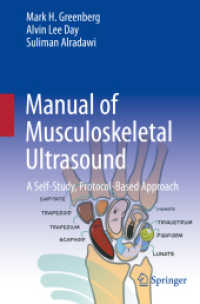Full Description
This book explores a spectrum of contemporary photographic practices across the fields of image-making, curating, archiving, teaching, community development and activism that have envisioned photography as ontologically and ethically collaborative. By looking specifically into the contexts where collaborative projects are produced and shown, and into the dialogical relation to the people they engage with -in hospitals, in prisons, in working-class neighbourhoods, with indigenous people, refugees, women, persons experiencing homelessness, young people- the contributions from practitioners, scholars, and curators show participatory practices to create the conditions for building new subjectivities, or making visible a multiplicity of identities, thus opening up a new politics of visibility. Therefore, this book specifically addresses the political, counter-cultural dimension of collaborative projects, but also their subversiveness in relation to dominant practices within the field ofphotography: this includes a reinvention of the position of the photographer -in turns facilitator or project leader- of curating and exhibition models, of archiving methodologies, of photographic education and of market practices.
Contents
1. Introduction - Photography as Collaboration: changing the paradigm on old and new practices in photographic creation and circulation.- Part One. The politics of voice, visibility and identity.- 2. 'A photography of becoming. Re-imagining the promise of participatory photography through the image of young photographers from refugee and diaspora communities in the UK'.- 3. '" Untitled": collaborative creation of a photographic record of a psychiatric home' .- 4. 'Urban change, politics and photography in post-war Britain' .- 5. 'Le ciel par-dessus le toit : Photographing in prison' .- Part Two. Public display and the distribution of collective projects.- 6. 'Commercially Unavailable: The Distribution of Participatory Projects' .- 7. 'The dominance of single-artist exhibitions in French institutions: is the photographic scene running counter to trend ?' .- 8. Reflexive Portfolio.- Part Three. Archiving and curating collective practices.- 9. 'The Jo Spence Memorial Archive' .-10. "Re-activating the archive: how and for whom?".- 11. Reflexive Portfolio.- Part Four. Common spaces, collective expressions.- 12. "Mapping local territories through participatory projects .-13. 'Charged with Collaboration'.-14. Reflexive Portfolio: David Kendall.- Part Five. Towards an ethics of collaboration.- 15. 'Participatory creation.- 16. 'Photographic education and the collaboration of resource sharing'.- 17. Reflexive Portfolio.







